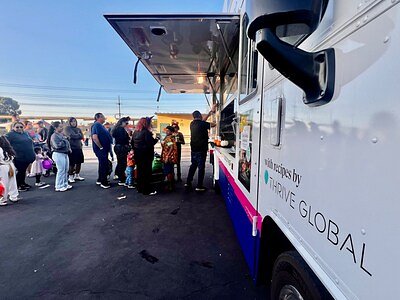
Beyond Healthcare: Insurer Tackles Diaper Need to Address Social Determinants of Health
Blue Shield of California Promise Health Plan’s ‘Promising Start’ program provides new parents with essential supplies, going beyond traditional care to address the social factors impacting health outcomes.
Beyond Healthcare: Insurer Tackles Diaper Need to Address Social Determinants of Health
SAN DIEGO, CA – November 20, 2025
Insurer Steps Beyond Traditional Care
Blue Shield of California Promise Health Plan is expanding its commitment to member well-being with the launch of ‘Promising Start,’ a program providing essential newborn supplies and diaper vouchers to pregnant members in San Diego County. While seemingly outside the realm of traditional healthcare, the initiative highlights a growing recognition among insurers that addressing social determinants of health – the economic and social conditions that influence an individual’s health – is crucial for improving population health and reducing health disparities.
The program, which builds on the insurer’s existing Medi-Cal Maternity Program, aims to alleviate the financial burden on new parents, particularly those enrolled in Medi-Cal, by providing a ‘Promising Start’ kit containing diapers, creams, and pads, alongside vouchers for additional diaper purchases through Amazon. Approximately 800 pregnant members are expected to benefit from the program in its first year.
The Real Cost of Raising a Child
The financial strain on new parents is significant, and the cost of basic necessities like diapers can be a barrier to providing adequate care. “The economic realities for many families are incredibly challenging,” says one local community advocate. “The cost of everything has gone up, and diapers are not a luxury – they're a necessity for infant health.”
According to recent data, approximately 11% of San Diego County residents live below the federal poverty line, and nearly 35% struggle to earn self-sufficient wages. A month’s supply of diapers can easily cost between $70 and $80, representing a substantial financial burden for families already struggling to make ends meet. “For many families, it’s a choice between diapers and other essential needs like food or rent,” explains a social worker familiar with the challenges faced by low-income families in the region.
The lack of government assistance for diapers further exacerbates the issue. Essential hygiene items like diapers are not covered by programs like CalFresh or WIC, leaving many families reliant on charitable organizations like the San Diego Food Bank and the Junior League of San Diego to meet their basic needs. These organizations, while invaluable, are often stretched thin and unable to meet the growing demand for diaper assistance.
A Growing Trend: Insurers Address Social Needs
Blue Shield’s ‘Promising Start’ program isn’t an isolated case. It reflects a broader trend of health insurers recognizing the impact of social determinants of health on health outcomes. “Insurers are increasingly realizing that they can’t simply treat illness after it occurs – they need to address the underlying social and economic factors that contribute to poor health,” says a healthcare policy analyst. “Investing in programs like ‘Promising Start’ can be a cost-effective way to improve population health and reduce healthcare costs in the long run.”
While most insurer initiatives focus on connecting members with social services or addressing food insecurity, a direct provision of essential supplies like diapers is relatively uncommon. This direct approach is attracting attention as a way to immediately alleviate financial stress and improve infant health. Other examples of insurers tackling social determinants include providing transportation assistance to medical appointments, offering housing assistance, and partnering with community organizations to address food deserts.
Tennessee's TennCare program and the San Francisco Human Services Agency offer diaper benefits to specific populations, but the Blue Shield program stands out for integrating these supplies with preventative care. The program isn't just about providing diapers; it's also about connecting new parents with resources to support maternal and infant health. The insurer is leveraging the program as an opportunity to promote well-child visits and postpartum screenings, further emphasizing the link between social support and health outcomes.
The ROI of Preventative Care
The integration of social support with preventative healthcare is a key component of ‘Promising Start’s’ potential for long-term impact. Extensive research demonstrates the cost-effectiveness of both well-child visits and postpartum care. Regular check-ups allow healthcare providers to monitor infant development, identify potential health issues early, and provide parents with the education and support they need to raise healthy children.
Postpartum screenings for depression and other mental health conditions are also crucial for ensuring maternal well-being and promoting healthy parent-child bonding. Early intervention for mental health conditions can prevent long-term health problems and improve overall family functioning.
“Investing in preventative care is not just the right thing to do – it’s also the smart thing to do,” explains a public health official. “By addressing health issues early on, we can prevent more serious and costly problems down the road. “Preventative care programs, like ‘Promising Start’, can significantly reduce healthcare costs and improve overall population health by prioritizing the physical and mental well-being of mothers and infants.
Blue Shield of California Promise Health Plan’s consistently high ratings from NCQA, particularly its performance in prevention and population health, underscore its commitment to delivering high-quality, preventative care to its members. ‘Promising Start’ builds on this existing foundation by addressing a critical social need and connecting members with the resources they need to thrive.
